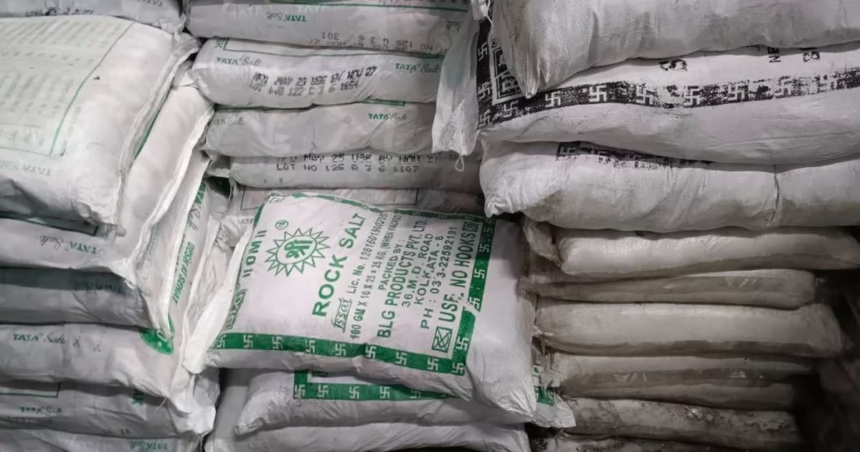For the past three decades, Vipan Kumar has been importing Himalayan pink salt from Pakistan to sell in India.
The 50-year-old trader who is based in Amritsar in Punjab, the spiritual hub of Sikhs in India, told Al Jazeera that the recent blanket ban on trade between the two countries following the massacre of 26 people, mostly Indian tourists, at Pahalgam in Indian-administered Kashmir in April has brought that trade to a screeching halt after New Delhi banned imports of all Pakistani goods, including those routed through third countries.
Kumar says he typically sold 2,000 to 2,500 tonnes of pink salt a quarter. “The profit margin is very thin, but still the business is feasible because of the bulk sales. But the ban has completely halted the pink salt business. We don’t know when the situation would turn normal,” he told Al Jazeera.
The Himalayan Pink Salt has a pinkish tint due to a trace of minerals, including iron, and is used in cooking, decorative lamps and spa treatments. Hindus also prefer to use this salt during their religious fasts as it is a non-marine salt.
Mined in Pakistan
The Himalayan pink salt is mined at the Khewra Salt Mine in the Punjab province of Pakistan, the second largest salt mine in the world after Sifto Salt Mine in Ontario, Canada, and located about 250 kilometres (155 miles) from the city of Lahore, which also at times lends its name to the pink salt – Lahori namak, which is Hindi for salt.
The salt mine contains about 82 million metric tonnes of salt, and 0.36 million metric tonnes is extracted every year. About 70 percent of the salt is used for industrial purposes, and the rest for edible use.
“The mine is very scenic and attracts several thousand tourists every year,” Fahad Ali, a journalist who lives close to the mine, told Al Jazeera.
It has approximately 30 salt processing units where the huge rock salt boulders are hand-mined and loaded on trucks before being dispatched, he said.
The salt is exported in a raw form to India, where importers process, grind and pack it for sale.
Prices swell
India mostly depends on Pakistan for this pink salt.
But after the Pahalgam massacre, India announced an end to all trade with Pakistan, which reciprocated the ban. The halt in trade was one of a series of diplomatic and economic tit-for-tat measures the neighbours took against each other before engaging in an intense four-day exchange of missiles and drones that took them to the cusp of a full-fledged war. On May 10, they stepped back from the brink, agreeing to a truce. However, the trade ban remains in place.
Salt traders in India told Al Jazeera that the current pause in imports has started to hamper their business as prices are starting to rise.
“It has been barely over a month since the announcement of the ban, and prices have already gone up,” said Gurveen Singh, an Amritsar-based trader, who blamed traders with existing stocks for selling them at higher prices.
“The salt which was sold in the retail market for 45 rupees to 50 rupees per kilogramme [$0.53-$0.58] before the ban is now being sold for at least 60 rupees per kilogramme [$0.70],” Singh said.
In some places, the price is even higher. In Kolkata this week, pink salt was being sold in markets for between 70 rupees and 80 rupees per kilogramme [$0.82-$0.93].
“We have no idea when the situation would return to normal. There would be complete crisis once the stocks get exhausted,” he said.
The rates, however, go up even more on the other side of India in the east due to the transportation cost incurred to send the salt from Amritsar.
Traders in Kolkata told Al Jazeera that the prices of the salt have gone up by 15-20 percent in the city, but that has not hampered demand as yet.
“The Himalayan rock salt remains in huge demand across the year, especially during festivals when people remain on fast and prefer the pink salt over the marine salt that is produced in India,” said Sanjay Agarwal, a manager in a private firm that deals in pink salt.
Dinobondhu Mukherjee, a salt trader in Kolkata, said that the government should look for an alternative country to procure this salt. “The relations between the two countries are usually strained, and that affects the trade. Our government should look for alternative countries to procure the salt so that the supply chain is never disrupted,” Mukherjee told Al Jazeera.
Pakistani exporters, however, said that the Indian ban would have a “positive impact” on their trade. Indian traders, they said, brand their salt as their own to sell in the international market at higher prices.
“The recent ban would help us to expand further as it would wipe off the competition from India,” Faizan Panjwani, chief operating officer of Karachi-based RM Salt, told Al Jazeera.
“Undoubtedly, India is a big market and has a lot of potential, but we want to send the salt by doing value addition and not in raw form. Our salt is already in huge demand globally,” he said.
Trade decline
Trade between the two countries has been decreasing since the 2019 attack on security forces in Pulwama in Indian-administered Kashmir in which 40 security personnel were killed. In response, India revoked the non-discriminatory market status – better known as Most Favoured Nation (MFN) status – that it had granted to Pakistan. It also imposed heavy tariffs of 200 percent on imports from Pakistan.
According to India’s Ministry of Commerce, the country’s exports to Pakistan from April 2024 to January 2025 stood at $447.7m, while Pakistan’s exports to India during the same period were a paltry $420,000.
In 2024, India imported about 642 metric tonnes of pink salt, which was far lower than the 74,457 metric tonnes imported in 2018 – largely as a result of the high tariffs.
Prior to the latest ban, India’s major exports to Pakistan included cotton, organic chemicals, spices, food products, pharmaceuticals, plastic articles, and dairy products. India normally imports copper articles, raw cotton, fruits, salt, minerals and some speciality chemicals from Pakistan.
“The implementation of the heavy duty had raised the import price of the salt from 3.50 rupees [$0.041] per kilogramme to 24.50 rupees [$0.29] per kilogramme in 2019, even though the salt was being routed from the third country like Dubai,” trader Kumar told Al Jazeera.
“Still, it had not impacted our business as the demand was too high, and buyers were ready to pay the price. But the government, this time, has also prohibited the entry of Pakistani goods from any third country, which has brought the supply to a complete standstill,” he said.
One unusual industry that is being hurt by the ban – lamps made from the Himalayan pink rock salt that are used as decorative lights and even tout unproven claims of being air purifiers.
“We have to look for an alternative country if the supply of rock salt doesn’t come from Pakistan,” said Global Aroma founder Deep, who uses a single name. “The prices of the lamps had already increased after the imposition of a 200 percent tariff in 2019, and the procurement from any other country will lead to further escalation of cost.”









